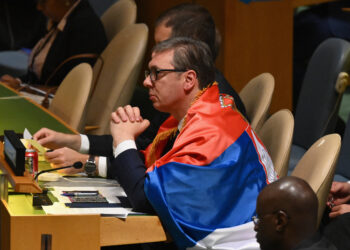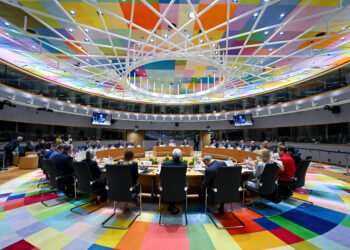Brussels – Ukraine can count on its most influential supporter on the path to EU membership: the European Commission president, Ursula von der Leyen, is making a personal pitch for accelerating Kyiv’s entry into the EU. “It can be the strongest security guarantee” and a “just and lasting peace,” she highlighted today (May 7) while speaking at the European Parliament in Strasbourg. The goal – which the EU leader reportedly agreed with Zelensky in Rome at the funeral of Pope Francis – is “to open all clusters of accession negotiations in 2025.”
The top leaders of European institutions agree that Ukraine’s accession must occur as soon as possible at the cost of making Kyiv come ahead of long-standing candidates, such as the six of the Western Balkans. Serbia and Montenegro, for example, have already had negotiating chapters open for years but are moving slowly toward completing the total 35. However, as emerged at the last European Council, member states, which hold veto power over the candidate countries’ advances, are divided. On closer inspection, the EU has already failed on its promise to open the membership process by March. While the path has been set in motion formally, none of the negotiating clusters have been opened, not even that of the so-called core chapters.
On the one hand, there are the Baltic and Nordic countries (Denmark, Finland, Sweden, Estonia, Latvia, and Lithuania) that would like to speed up the process. Poland, which currently holds the six-month rotating presidency of the EU Council, also agrees in principle. Still, it is more cautious because it is aware of the difficulties in building a unanimous consensus that currently does not exist. While they generally agree on the need to enlarge the Union to include Kyiv, Southern and Eastern European countries have different sensitivities and reservations about bypassing other candidate countries with which they historically have closer relations.
Then there is the usual elephant in the room — Viktor Orbán, who simply wants nothing to do with it. Even today, the Patriots for Europe group, a creature founded by the Hungarian sovereignist premier, reiterated its no to Ukraine’s entry into the EU: “It is not in our interest. It would cause serious damage to agricultural policy, cohesion policy and more,” said Kinga Gal, the group’s vice-chair and a member of Fidesz, Orbán’s party. Ukraine is not in line “with any of the accession conditions of accession,” Gal continued, denouncing the risk of “double standards” in Brussels’ enlargement policy.
The pro-Russian position of Budapest – and the Patriots – goes far beyond opposition to enlargement to Kyiv. Hungary shares none of the three priorities listed today by von der Leyen to ensure a “just and sustainable” peace is achieved. It opposes support for Ukraine’s defense capabilities and, even more, the phasing out of Russian fossil fuels. While it can proceed with 26 member states on these two – with some workaround – on accession, it cannot. And continuing to set dates and make promises becomes risky.
English version by the Translation Service of Withub



![Il presidente degli Stati Uniti, Donald Trump, al Wold Economic Forum [Davos, 21 gennaio 2026]](https://www.eunews.it/wp-content/uploads/2026/01/trump-davos-260121-350x250.png)

![[Bruxelles, 14 gennaio 2026]](https://www.eunews.it/wp-content/uploads/2026/01/aiuti-ucraina-350x250.png)




![[foto: Guillaume Baviere/WikimediaCommons]](https://www.eunews.it/wp-content/uploads/2026/01/Cuba_Che-120x86.jpg)